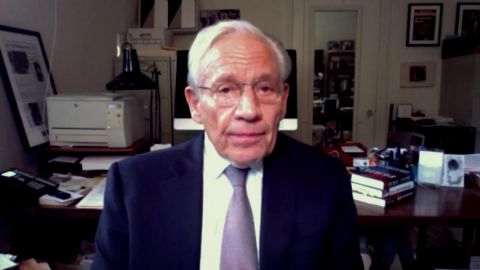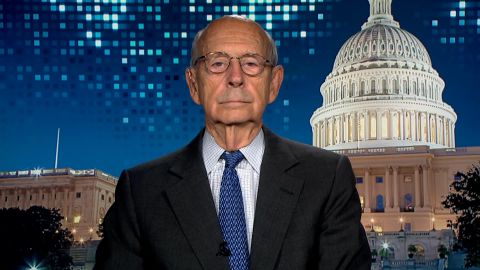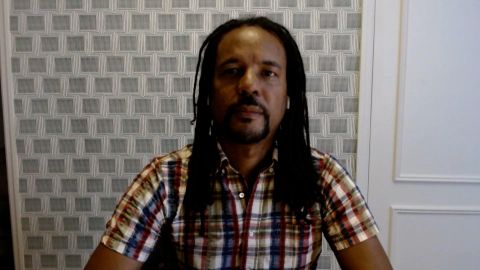Read Transcript EXPAND
CHRISTIANE AMANPOUR: Next, Washington, where top military leaders testify for a second day on the withdrawal from Afghanistan. Chairman of the Joint Chiefs General Mark Milley revealing president Trump ordered the withdrawal of all U.S. troops in Afghanistan by January 15th before walking that decision back days later. General Milley also addressed and defended his actions during the last days of the Trump administration. He specifically spoke about new details in “Peril,” the latest behind the scenes political reporting by Bob Woodward with Robert Costa, which reveals phone conversations to reassure nervous Chinese generals. Despite criticism, Milley said he doesn’t regret speaking to Woodward. And Woodward, of course, as we know, is the award winning investigative journalist known for work on the Watergate scandal and here is now talking with Walter Isaacson about the latest revelations.
WALTER ISAACSON: Thank you, Christiane. And Bob Woodward, welcome to the show.
BOB WOODWARD, “THE WASHINGTON POST”: Thank you.
ISAACSON: General Milley just gave some extraordinary testimony and, among other things, he totally confirmed what you and Bob Costa had in your new book, “Peril,” and he said he made the phone calls that your book opens with, with the Chinese leader, with the full authority of the Secretary of Defense, briefing the White House and the secretary of state. Comment on that if you would and what you thought of his testimony.
WOODWARD: I thought we had heard some things but we had not been able to confirm them. And I was sure, because his testimony was so accurate, that that occurred, that he had instructions or knowledge of these senior people.
ISAACSON: And he briefed the secretary of state. How come the secretary of state and others, if this was so bad, didn’t push back?
WOODWARD: Well, I think they kind of flipped, really, carried them all. I think we find and we show in the book, secretary of state was Pompeo. And finally, into November and the days after the election, Pompeo is telling Milley that president Trump is in a dark place and, quote, “the crazies are taking over.”
ISAACSON: Your book has wonderful scenes in which all of these types of things are explained. Very intense inside narrative but it’s also a bigger morality play and the book reminded me of the play, “Antigone,” which pits the people who are collaborationists, who enable king and power, versus those who speak truth to power. And it’s that clash. There’s so many in us a collaborationist instinct at times but the heroes of your book say, let’s push back. That was Gina Haspel, Robert O’Brien, who else?
WOODWARD: And Milley; Milley was the activist here, because he saw it. I mean, back before the election, he gets this call, which he confirmed this week, and talks to the Chinese — head of the Chinese military. And the general said — this is two days after the insurrection. So it’s January 8th. And Lee’s (ph), “What’s going on in the United States? “Is it collapsing?” The Chinese go on alert again. Turns out Iran went on alert. Russia went on alert. And Milley is saying, my God, I’ve got to convince these people that everything is fine in the midst of this same day. He gets this call from Nancy Pelosi, in which we have a transcript. And Nancy Pelosi is saying, with a kind of almost cinematic clarity, you know, Trump’s crazy. He could launch nuclear weapons. What is the guarantee? And Milley says, oh, no. don’t worry. Procedures are fine. And then it goes on and he realizes that she’s got a point. And one of the most extraordinary scenes, he calls in the people at the National Military Command Center, the Pentagon war room. And he says, if you get an order from anyone, including president Trump, I have to be in on it. And as you know, from your Kissinger book, this didn’t happen any other time we know of, except 1974, when Secretary of Defense Schlesinger was worried about Nixon going around the bend and did exactly the same thing, issued orders; no one take directive from Nixon or the White House without involving Schlesinger. So this is, as we reported it out, Milley is alarmed. And now people who have read this book are alarmed. This was a national security crisis. This was not just a domestic crisis. And what is fascinating, one aspect, is that Milley alone alerted the national security state — the CIA, the NSA, the Chiefs, the admiral running operations around China — and the world didn’t know. We were on the edge, in peril.
ISAACSON: What surprised you, if anything, about General Milley’s testimony this week?
WOODWARD: This is very interesting. He issued a statement, saying what he said to Pelosi. And then he added, which was not in the statement — and I am not qualified to determine the mental health of a President of the United States.
(CROSSTALK)
ISAACSON: Why would he add that?
WOODWARD: Well, I think it’s true. I think he’s not qualified. And as we know in our lives, people will say so-and-so is crazy. And we’re not qualified to make a medical or psychological —
(CROSSTALK)
ISAACSON: But is it part of his role as the Chairman of joint Chiefs, if he’s communicated a nuclear order, to try to figure out whether the president is truly sane in doing it?
WOODWARD: I think it is. I think the responsible course of action — he did not take away any power, constitutional power that the president has, his commander in chief. He merely said, I must be involved. And he’s, in that very unique role, adjacent to the chain of command, not in the chain of command. And when he calls Admiral Davidson on January 8th to say, I’m not, he tells him, reminds him, I’m not the chain of command. I can’t order you. But it would be best if you postpone or cancel the very aggressive military exercises that are going on in the South China Sea and around Taiwan. And Admiral Davidson agrees immediately and postpones that exercise. Those exercises, this is clearly someone who’s alarmed. He goes to the Joint Chiefs and he says, watch everything.
ISAACSON: But would we worry if that had happened, say, with rogue generals, doing that to a mainstream president?
WOODWARD: Well, I think you wouldn’t see — I don’t see any evidence — maybe there will be evidence that surfaces at some point that this was a rogue operation. As we reported it — and if you go back into the book and see all of these screaming fits that Trump had, I mean, this is — and what Trump is saying about the election and insisting that it was stolen. . And we present evidence that rebuts that, as completely, as you can, from Trump’s closest advisers, closest supporters. Senator Lindsey Graham of South Carolina and Senator Mike Lee of Utah, they take the memos that they get, which we’ve got, which we produce for the first time. And you see these staunch supporters looking at the evidence and saying, there is zero evidence of any stolen election. We — Bob Costa and I spent a long time looking at this. Maybe there would be evidence of a stolen election. We found none and Trump’s closest supporters in this case (INAUDIBLE).
ISAACSON: Let me go through some of the characters in your book, as they fall into this divide of either enabler, collaborationist or people willing to stand up and tell truth. One of them is Bill Barr, the attorney general. Give me your thumbnail of what you discovered.
WOODWARD: Well, Bill Barr rode both horses. You’re familiar with this in Washington, where some — he was supportive of Trump. He wanted Trump to win in 2020 last year but he gave him some very candid advice. And Barr said in an extraordinary meeting with Trump last year, president Trump, Barr said, I travel around the country as much as any cabinet officer. And you have support there. I talked to your supporters. But Mr. President, let me tell you, they think you are an effing A-hole. And laid it right out and said you’ve got to change if you want to be reelected. Of course, Trump did not. And then Barr praised Trump when he resigned later in December of last year. And so, like many figures, they take both positions. But he gave — and people have written about this, having looked at the book, that some of Barr’s advice was pretty good to Trump.
ISAACSON: One of the people on the most collaborationist and stoking up, enabling side, was Rudy Giuliani, on the scene with hair dye streaming down his face. And he’s the one in your book that stokes up the president, who might not have done this. Were you surprised about what you found about Giuliani’s sort of creepy behavior?
WOODWARD: Well, it’s not just creepy; it’s bogus in many ways. We have his memos that he sent to Lindsey Graham which make claims that thousands of prisoners voted. There’s no evidence of that. It all evaporated. But you see Giuliani irrationally, in one day, in the White House, saying I have eight affidavits to support my position and then, I think in the same day, just declares it’s 28 affidavits and then I think at the end, he says I have 80 affidavits. Well, not true. And Trump took it, believed it, staked the whole year on the claim of the stolen election. Giuliani and this lawyer, John Eastman, who wrote the memo, which is really a blueprint for trying to get Pence to throw the election, in a way, people have landed on that and said, this is almost unconstitutional. This is — but there it is. Eastman saying to — in the memo that he gives to Senator Lee, saying there’s seven states that have alternative electors. And Lee said, wow. That’s amazing. And he spent days — as you know, a senator who could get anyone on the phone, calling around to people who ran the legislatures in Arizona and Wisconsin, Pennsylvania and Georgia. Everyone said nothing. Does not exist. There are no alternative legislators. Now it’s not a matter of it just being untrue; the allegation evaporates. It’s nothing.
ISAACSON: You know, Michael Pence, we think, as vice president, was the one who stood up and did the right thing and certified the election after that horrible insurrection. But in your book, it was a closer call than I thought it was. How dangerous was that?
WOODWARD: Well, it was. And again, Pence is somebody who rode both horses. He was trying to accommodate Trump, if possible — and we chart in detail. He gets a call from Dan Quayle, the former vice president, who, in 1993, had to, according to law and Constitution, certify the election of Bill Clinton and Al Gore. And here’s Quayle standing up, essentially validating, not essentially, validating the process that elected Clinton and Gore. And so Bush Senior and Quayle were out. And it’s interesting because here’s Quayle, citing the Constitution, citing the law to Pence. And Pence is looking for some way out and it zigzags, quite frankly. And in the end, he did the constitutional, legal thing but there’s no certainty in that.
ISAACSON: The other people in the book, two of the leaders, Kevin McCarthy in the House, Mitch McConnell in the Senate, they end up being enablers, despite themselves. Is the Republican Party and are people like McCarthy and McConnell going to try to take the party back or have they decided they have to make their peace with Trump?
WOODWARD: We showed that they both disdain Trump in private and, sometimes, quite directly and then, publicly, are behind him in using him and, particularly, McConnell is very happy with all the conservative judges that had been appointed, not just the Supreme Court but the district courts and the appellate courts. That legacy is going to live on for decades, quite frankly. Trump, in my last book, “Rage,” I concluded he was the wrong man for the job and I think we see continuing evidence of that. But we have a democracy and he’s out there. Bob Costa’s somebody who loves the punishment of reality. And so he listens to Trump’s rallies. They are quite something. People are dismissing them. Don’t dismiss them. He’s, in a way, Churchillian, saying we will never give up. We will fight forever. It’s quite — and the people in the audience love it and cheer and — he is essentially going out, giving war speeches.
ISAACSON: The last sentence of your book hit me hard. It’s only two words long. Tell me what the last sentence is and what it means.
WOODWARD: “It all remains. It’s not over.” Trump is out there; unlike Nixon, Nixon never said it was going to run again. Trump is campaigning for that nomination and position. And look what he brought us. And as, you know, he had a way of not only touching that chord with tens of millions of people but, in 2016, he mobilized them. And in 2020, last year, if you change 45,000 votes in three states, Arizona, Wisconsin and Georgia, Trump would be president again. So talk about dodging the bullet, it couldn’t be clearer. And — but the bullet’s dodged and it kept going and then it turned around. And it’s heading for the United States once again.
ISAACSON: Bob Woodward, thank you so much for joining us.
WOODWARD: Thank you.
About This Episode EXPAND
Stephen Breyer; Colson Whitehead; Bob Woodward
LEARN MORE


